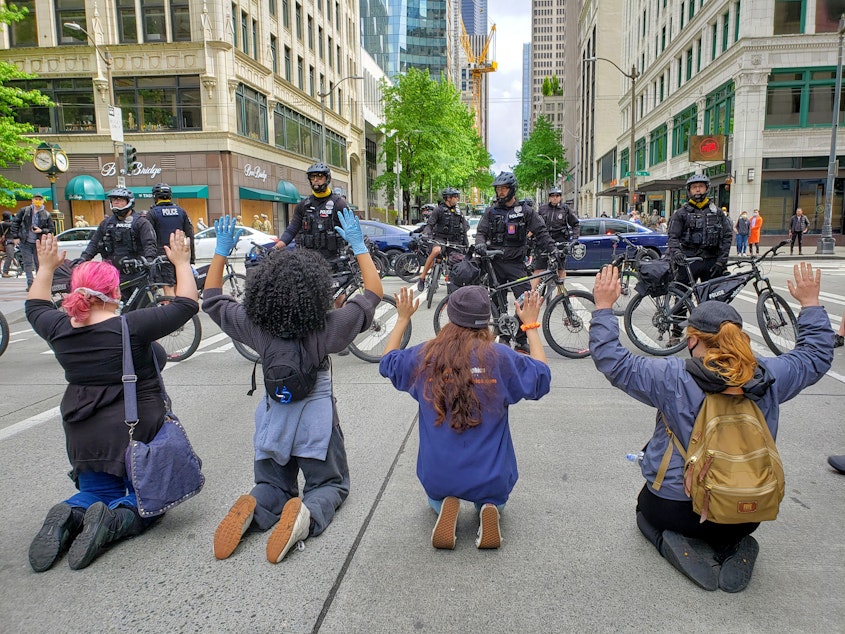Looking back at one week of protesting in Seattle

A week ago today Seattle joined in the nationwide protests over police killings of Black people like George Floyd in Minneapolis.
Thousands have marched peacefully. But there have also been tense confrontations between demonstrators and police and dozens of arrests over damage downtown.
This weekend, the protesters will be on the streets again.
Reporters Esmy Jimenez and Casey Martin have been covering the story this week and spoke with KUOW’s Paige Browning.
Paige Browning: Both of you have spent a lot of time out in Seattle, Bellevue and Tacoma over the past seven days. What has stood out to you about the protests?
Casey Martin: I've been really surprised about how quickly thousands of people have organized in such a short amount of time. This has not just been a one-day angry protest. Activists are protesting and marching for many hours every single day, and a ton of those people are donating food and water and first aid supplies. There are dozens of volunteer medics who have set up first aid stations for people who might get injured by the police. And in less than a week people have taken on these roles and organized really, really quickly.
Esmy Jimenez: I'd say the other thing is how far this movement is really rippling. You know, we're seeing these protests in the major cities in the Puget Sound area. But there are protests all over the state, whether that's tiny ones in Walla Walla, Sequim, Yakima and the Tri-Cities.
The other thing I would note is how many people are involved. The numbers are just staggering. It's really hard to gauge in real time, but it's in the thousands every single day. I'd say also, watching the group as a whole evolve over the last week, and how they're dealing with police is really interesting. Sometimes they're bringing umbrellas to avoid pepper spray. Recently, I've been seeing groups that are handing out goggles and masks to avoid to tear gas, but also to limit exposure to COVID-19 during all this, because of course, we're still in the middle of a pandemic.
Browning: The police killing of George Floyd in Minneapolis launched the protests here. But what do marchers in Seattle want?
Martin: You know, there are a lot of different groups, a lot of different people who are see success differently, but they generally want to see broad police reform in Seattle. A big one is defunding the Seattle Police Department by 50 percent. Some activists want to see that money, go to de-escalation training for police or going toward social services programs.
There are also specific things like police covering their badge numbers. Seattle Mayor Jenny Durkin has said police now have to show their badge numbers. But just last night, plenty of them still had them covered. And peaceful, unarmed protesters who have been tear gas multiple times are asking that police stop gassing them.
Jimenez: Marchers are also asking that any protesters who have been jailed in this last week be released immediately. And so far, we've seen that some of these requests have been successful. Not all of them. But for example, activists were saying that the curfew here in Seattle was escalating tensions and unfairly limiting protesters, and that curfew did get removed by Wednesday evening.
Browning: Both of you have shared moving accounts from the anti-racist protests. What are things that really stuck out to you that you've seen?
Jimenez: So one thing that I saw was in Tacoma, and this is on the intersection where Manuel Ellis was killed by law enforcement. He's a Black man who was killed in March. But one of the things I noticed on that intersection is that there was a sign that was written in purple Crayola, and it just said, "We support you." And it was scribbly writing, it was signed by 6-year-old Genevieve. And that just really sunk in that there are children, there are parents, everyone in this community is watching this closely.
Martin: One day this week, a huge group of people, a few thousand people, were marching through downtown Seattle, and I was walking ahead. And suddenly I heard near complete silence and I turned around, and I saw that the entire march was lying face down in the street with their hands behind their backs. Then they all began chanting George Floyd's last words, “I can't breathe,” and the street was packed with people as far as I could see, laying down and chanting. And that was something else. I had not seen that at any other protest.



